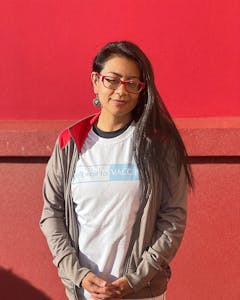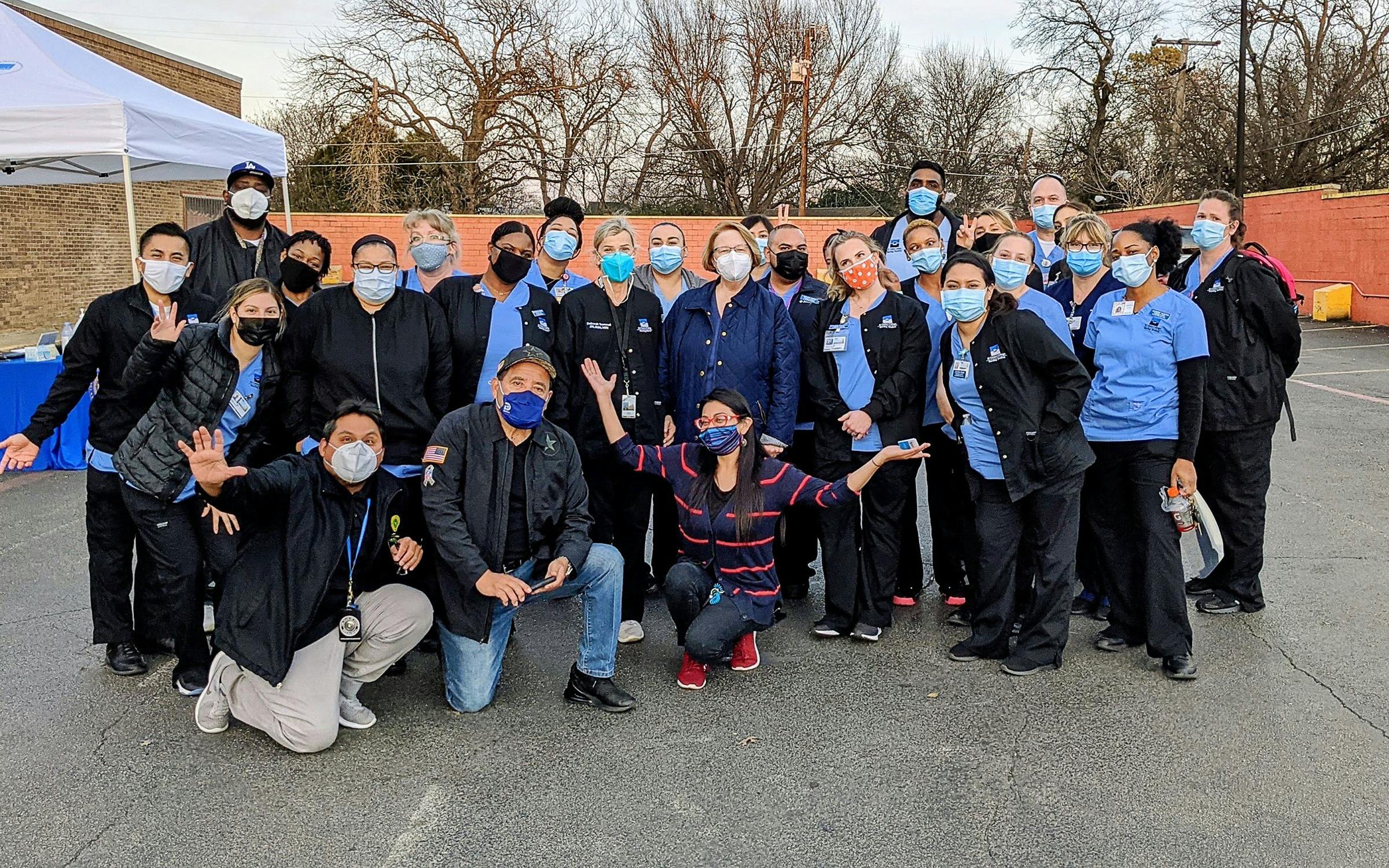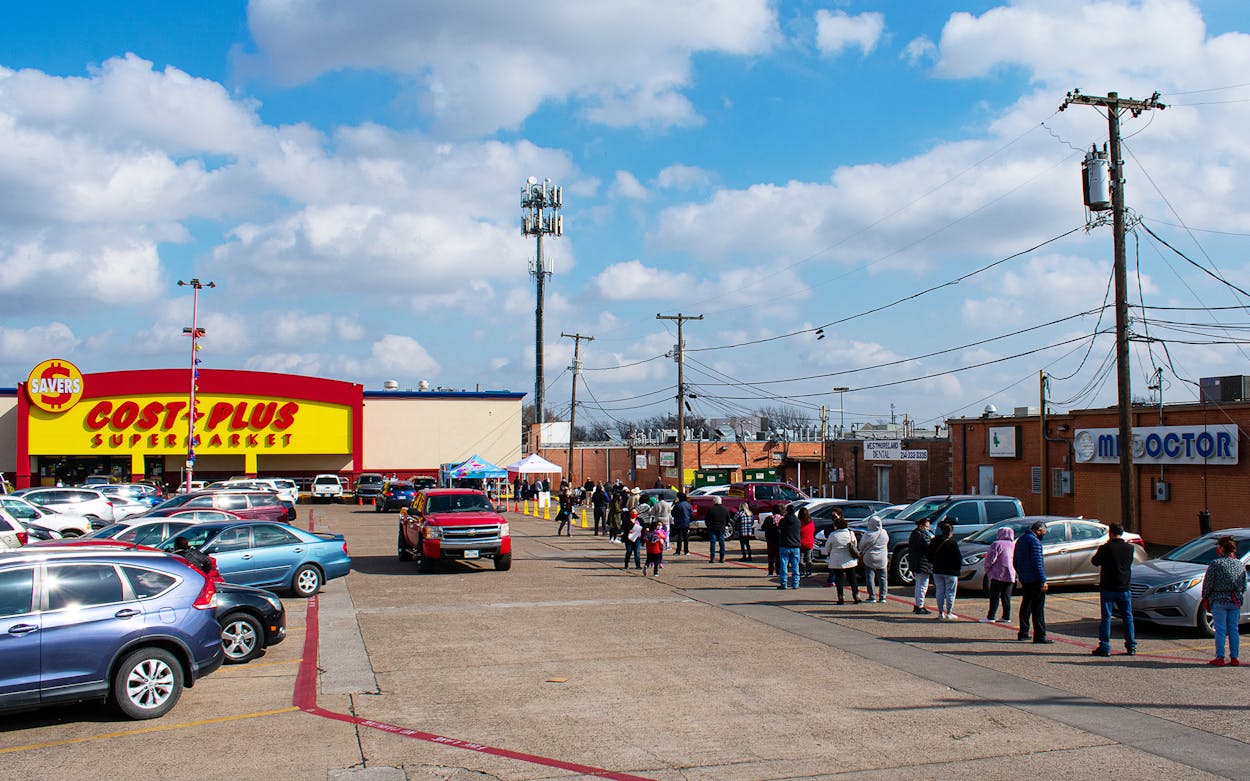One rainy Saturday in late January, a woman in her fifties and a man in his nineties walked up to a table temporarily set up in front of a barbershop in the Oak Cliff section of Dallas. They had waited in a line that wrapped around the block, mostly among others who looked like them—middle-aged or older Hispanic folks, outside shivering in the cold weather in the hopes of getting registered for their chance to receive a COVID-19 vaccine.
Marisa Gonzales, the Dallas County Health and Human Services community outreach director, who was there along with a handful of volunteers, greeted them. Gonzales saw in them what she saw in many of the registrants that day. “They don’t have insurance, and they might not be here legally, and they’re hiding in the shadows because of the fear,” she says.
The woman told Gonzales she had just happened to drive by the barbershop that morning, and when she found out why people were waiting there, she went to pick up her father and bring him along. Because of Gonzales’s position with the county, when she learned that the woman’s father was ninety—already eligible for the vaccine in Texas under phase 1B—she was able to make him an appointment for the following week. His daughter burst into tears, “because she had been so afraid that he would not get a vaccine. I don’t think this woman knew where to go,” Gonzales says. If not for the registration event that day, “who knows what would have happened to this frail man?”

Early this year, Dallas County launched an online portal for vaccine registration, but it was failing to draw many sign-ups from vulnerable communities disproportionately affected by the COVID-19 pandemic. The day after Gonzales met this daughter and father, the county released data showing that 60 percent of its vaccine registrants were white, 16 percent were Hispanic, and 10 percent Black. White residents (only 28 percent of Dallas County) were seemingly overrepresented, while Hispanic (40 percent) and Black (24 percent) residents were being severely underserved.
The county has a four-person outreach team, led by Gonzales, that travels to senior centers and Dallas Housing Authority apartments almost daily to register people in person. The city of Dallas is lending laptops to community leaders trying to do the same. There also are hotlines manned by city and county staff members who can take registrations over the phone in English or Spanish.
But to close the vaccine gap, both the county and the city are relying on grassroots efforts like the one at the barbershop. More funding would aid government registration efforts, Gonzales says, but what money can’t provide are the connections and trust necessary for an effort this massive and this crucial. “Community stakeholders already have buy-in with the community,” she says. “The community trusts them because they’ve been in the community for years.”
The woman who’s driven registration events in Oak Cliff is a petite, 38-year-old single mom who sports long black hair and signature red glasses. Leslie Cannon has a history of community activism on health-care matters, most recently with Be the Match, a national marrow donor program. In her twenties, she traveled the nation working on a campaign to promote testing for HIV.
The Oak Cliff ZIP code of 75211, where Cannon lives, has —more than any zip code in Dallas, and the third-highest cases per capita. It’s one of eleven zip codes that county commissioners identified in mid-January as most vulnerable.
Last summer, as Cannon watched COVID cases and deaths spike in her community, she donned a mask, knocked on doors, and handed out fliers—which she created and printed herself—to tell her neighbors where and how to get tested, and how to prevent COVID’s spread. She recruited a local medical clinic to dispatch a mobile testing unit to a neighborhood supermarket and arranged for nursing students from Dallas College to staff pop-up events.
Cannon’s city councilman, Chad West, who had helped supply her COVID testing events, suggested this winter that she consider hosting a similar series of pop-up events focused on vaccine registration. She assumed she’d be volunteering her time just a few hours a week, but after the overwhelming need became apparent during the first several events in late January, “it’s taken over,” Cannon says. “It’s eighty to ninety hours a week.”
She has the time, since she’s between jobs because of a COVID-related layoff. She just needed resources for her organization, Armijo Dallas Helps, to pull it off. Armijo is Cannon’s birth surname. The Dallas native entered foster care before she was eighteen months old and remained in the system until she was adopted at age six. “With those types of obstacles early on in life, you learn to be really resourceful,” she says.
She remembers being in a Dallas judge’s chambers during her adoption process, when her biological mother and her adoptive parents both looked to lay claim to her young life. The judge acknowledged she’d been through a lot, and that the process ahead would be tough. “Just always know that Dallas is your family,” Cannon recalls him telling her. “I took that literally. I never even realized it wasn’t quite that literal until my late teens.”
When Cannon left Dallas at age eighteen for college in California, both of her biological parents were in jail, and she had filed restraining orders against her adoptive parents because they were abusing her. She couldn’t get a Pell Grant to help pay for school, she says, because she didn’t have a parent she could name on the application. “There’s always a catch, and I was always caught in that,” she says. “It’s not as easy for some of us to move though the line. You get pointed out and have to move to the side and constantly watch other people go in. Not everyone gets in. There are circumstances beyond our control.”

Gonzales has become one of Cannon’s biggest cheerleaders, but she wasn’t sure what to make of Cannon at first. Their initial interaction was a phone call Gonzales made in late January when she found out someone was recruiting volunteers for a vaccine registration event. “I was thinking, ‘Who is this saying that they’re the county?’” Gonzales remembers.
But when Gonzales reached out, Cannon sounded delighted and immediately invited her to aid in the efforts. After the barbershop event—Gonzales’s first and Cannon’s third—Gonzales became a convert, offering Cannon county laptops and volunteers whenever possible. “With Leslie, the word that comes to mind is ‘impactful,’” Gonzales says. During February’s devastating winter storm, “even though her pipes froze, and she lost her electricity and had to take her kids to a hotel for a few nights, she was still out there working. The people appreciate her. They trust her. She is an advocate.”
Gonzales was stationed at Fair Park in early January during its first days as the county’s designated vaccine hub. Fair Park is in the South Dallas neighborhood, which is predominantly Black. Its 75215 zip code is another of the eleven that Dallas County identified as most vulnerable. Local officials had garnered positive press for locating the hub in a high-need neighborhood, but, day after day, Gonzales says, “We were not seeing any minorities coming through.” She wondered, “Why are these white people coming in here getting these shots and not people from these communities that are gravely affected?”
That’s when Gonzales began identifying barriers, such as “internet deserts,” she says, where many residents don’t have email addresses or mobile phones. Even if they could figure out how to get registered with the county, it might not be possible for the county to reach them to set up an appointment once one is available. “We have to vaccinate seventy to eighty percent of the population to get to herd immunity,” Gonzales says. “We can’t wait for them to come to us. We’ve got to go to them.”
The county’s in-person outreach efforts are able to register a few dozen people at a time, maybe one hundred on a good day. Meanwhile, Cannon’s initial events registered hundreds at a time, and two to three events in a day could surpass one thousand new registrants. The turnout demonstrated the unmet need in these communities. Dallas County Judge Clay Jenkins took note of Cannon’s success and asked Gonzales to lead a Zoom webinar encouraging other community organizers to host registration events in vulnerable neighborhoods. She used Cannon’s work as the prime example.
Plenty of local media attention has been paid to the infighting between city council members and the mayor, and between the county judge and commissioners, about how the vaccine should be rolled out and who should be in charge of vaccine hubs. An upcoming Dallas city council election in May likely is throwing gasoline on some of these fires. “There are politics involved because we are dealing with politicians,” Cannon says.
At first, the politics appeared to stand in her way of getting resources for registration events. Armijo Dallas Helps was recruiting the volunteers, borrowing the tables and chairs, printing registration forms in English and Spanish, and eating the costs. The county lent Cannon seven laptops, but the city’s office of emergency management denied her request for ten tables, thirty chairs, and five tents. Last summer, for the testing events, Councilman West’s office had lent her all of that plus generators. “These are things the city has in a warehouse somewhere,” Cannon says. A city spokeswoman told Texas Monthly that laptops, available through councilmembers, are the limit of resources being provided to support community-driven vaccine registrations.
Though the city hasn’t come to Cannon’s rescue, in February she found help from somewhat unlikely partners—three high school juniors who attend the all-girls private school Hockaday. The girls had formed an organization, Don’t Wait to Vaccinate, and at first they were simply posting infographics on social media to encourage vaccinations. They soon realized, however, that “there really are so many people who don’t have internet access, and those are the people who need the vaccine the most,” says Lucy Roberts, one of the girls. So they shifted their focus to registration efforts. With seed money from the girls’ families, Don’t Wait to Vaccinate is now sponsoring Cannon’s events and raising money to fund more of them. They joined forces with her after seeing Cannon in action during a February event at a Cost Plus Supermarket in Oak Cliff.
Efforts like Cannon’s are chipping away at the racial disparity gap in vaccinations, but much work remains to be done. The most recent State of Texas data shows that white people in Dallas County have received vaccines at more than twice the rate of Hispanic residents and more than three times the rate of Black residents. Other major Texas cities like Houston, San Antonio, and Austin face similar disparities. It’s cause for concern, says Dr. Josephine Thinwa, an infectious disease doctor at UT Southwestern Medical Center, who volunteered at the Cost Plus event. “I’m just worried we get two months from now and people are still dying, and it’s Black and brown people because white people are all vaccinated,” she says.
A few steps away, Cannon was thanking a dozen or so nursing students from Dallas College who had spent their day sitting at folding tables outdoors, entering data from registration forms. “We registered more than seven hundred people today,” she told the group of mostly Black and Hispanic students. She encouraged them, now that they were familiar with the process, to continue the work.
Cannon walked back to her SUV, her trunk filled with boxes of pencils, forms, staplers, and other supplies. She pulled out a stack of papers on which some of those registered had noted they don’t have transportation to get to a vaccine appointment. “What are we going to do about these people?” Cannon asked another volunteer.
Here again, she took on the problem personally. It wasn’t enough to get people registered if they couldn’t get the vaccine. “I always want to make sure we walk them through—beginning, middle, and end—so there’s no one thing that keeps them from moving forward,” Cannon says. “Or else we add to their frustration.” She wants them instead to feel what that judge told her so long ago: that Dallas is their family.
- More About:
- Dallas






